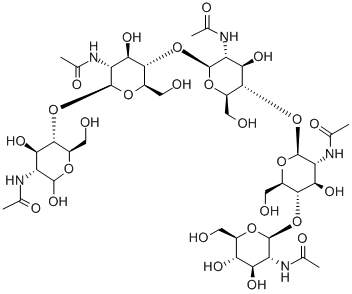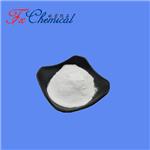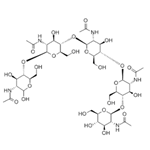Uses
- Elicits plant defense systems.
- carbohydrate component of lipo-chitooligosaccharides secreted by Rhizobia, functioning as a signaling molecule in the host plant.
- substrate for Rhizobium leguminosarum nodulation protein NodL.
Root nodules, like those induced on the roots of leguminous plants by Rhizobium bacteria, are important sites for the conversion of atmospheric nitrogen into ammonia. The initiation and development of these growths are driven by a variety of nodulation (Nod) proteins produced by the infecting bacteria. Penta-N-acetylchitopentaose is a pentameric chito-oligosaccharide involved in nodulation. It can be produced by NodC, a chito-oligosaccharide synthase, and serve as a substrate for NodL, an O-acetyltransferase.This bacterial product binds plant root lectins, and this interaction may be important in the promotion of cell division in the root cortex.Penta-N-acetylchitopentaose, as well as chitin and chitosan, inhibits nitric oxide production in LPS-activated RAW 264.7 macrophages.
Production Methods
Cell density cultivation of recombinant Escherichia coli strains harboring the nodC gene (encoding chitooligosaccharide synthase) from Azorhizobium caulinodans has been previously described as a practical method for the preparation of gram-scale quantities of penta-N-acetyl-chitopentaose. We have now extended this method to the production of allylated derivative of penta-N-acetyl-chitopentaose by using allyl 2-acetamido-2-deoxy-β-d- glucopyranoside (2) as the initial acceptor for the synthesis of target pentaoside in vivo.
- Chemo-enzymatic synthesis of allyl penta-N-acetyl-chitopentaose
- Huang, Gang-Liang; Zhang, Da-Wei; Zhao, Hong-Juan; Zhang, Hou-Cheng; Wang, Peng-George - Bioorganic and Medicinal Chemistry Letters, 2006, vol. 16, # 7, p. 2042 - 2043


